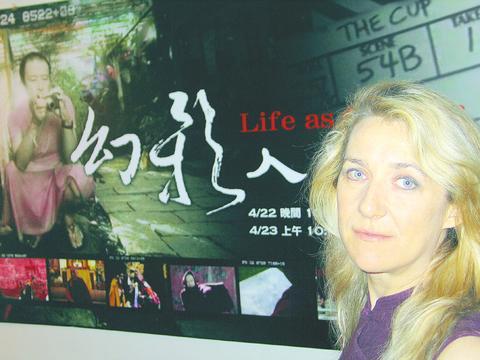Life as Cinema by Anika Tokarchuk is a 56-minute documentary about the making of The Cup (1999) (高山上的足球盃), the debut feature film of Dzongsar Khyentse Rinpoche (aka Khyentse Norbu).
Dzongsar Khyentse Rinpoche, a spiritual director of several Buddhist colleges in India, Bhutan and Sikkim, is recognized in his culture as the third incarnation of the Khyentse lineage of Tibetan Buddhism. Life as Cinema voices his Buddhist reflections on the impermanence of life.

PHOTO: BEN ZULLO
The film begins with Dzongsar Khyentse Rinpoche making a shadow butterfly on the wall with his hands. While the butterfly's magnified shadow flaps its dark wings on a white wall, he asks, "How do you know this is a butterfly?"
The shadow on the wall is like reality projected on the screen of our mind. The layers of illusion and reality are interwoven into each other. While the theme of illusion is dominant in the film, the encounter between modernity and tradition in everyday Tibetan culture is also telescoped into Dzongsar Khyentse Rinpoche's character.
Educated in London and given his first movie-related job by Bernardo Bertolucci in Little Buddha, Dzongsar Khyentse Rinpoch rides the tide of westernization and redefines his role as a Rinpoche.
When Tokarchuk informs the Dalai Lama that Dzongsar Khyentse Rinpoche is making a feature film based on the real events of the monks at Dzongsar Institute, he breaks into laughter commenting, "Oh, I see, lamas are actors now."
As she reveals in her documentary, the actors in The Cup are all from a real monastery and cast by their ecclesiastical superior. (Dzongsar Khyentse Rinpoche coaxed 14-year-old Jamyang Lodro into playing the role of Orgyen in The Cup with a promise of taking him to Disneyland.)
Jovial and with a sense of absurdity, Life as Cinema rings quiet notes of political urgency. Unlike other dramas on Tibet such as Kundun (1997) and Seven Years in Tibet (1997), Tokarchuk does not portray Tibet as mired in Chinese suppression. Instead, Life as Cinema tracks the footsteps of Tibetan Buddhists to India, France, England, Canada, Hong Kong, and of course Taiwan.
It is, after all, a documentary on Tibet-on-the-move, a film on the nature of change and openness.
The second part of the trilogy will go into the background of Dzongsar monastery in Tibet and focus on Karpu Lama, a Tibetan who now lives in Taiwan.
In a partial preview, Karpu's exile from Tibet is captured in a soliloquy that drifts across beautifully crafted images of Tibetan valleys and Taipei's streets. "Life is dreamlike," says Tokarchuk, "but it is also telling a history."
For your information :
There will be a free public screening of Life as Cinema at the Wisteria Tea House (

That US assistance was a model for Taiwan’s spectacular development success was early recognized by policymakers and analysts. In a report to the US Congress for the fiscal year 1962, former President John F. Kennedy noted Taiwan’s “rapid economic growth,” was “producing a substantial net gain in living.” Kennedy had a stake in Taiwan’s achievements and the US’ official development assistance (ODA) in general: In September 1961, his entreaty to make the 1960s a “decade of development,” and an accompanying proposal for dedicated legislation to this end, had been formalized by congressional passage of the Foreign Assistance Act. Two

Despite the intense sunshine, we were hardly breaking a sweat as we cruised along the flat, dedicated bike lane, well protected from the heat by a canopy of trees. The electric assist on the bikes likely made a difference, too. Far removed from the bustle and noise of the Taichung traffic, we admired the serene rural scenery, making our way over rivers, alongside rice paddies and through pear orchards. Our route for the day covered two bike paths that connect in Fengyuan District (豐原) and are best done together. The Hou-Feng Bike Path (后豐鐵馬道) runs southward from Houli District (后里) while the

March 31 to April 6 On May 13, 1950, National Taiwan University Hospital otolaryngologist Su You-peng (蘇友鵬) was summoned to the director’s office. He thought someone had complained about him practicing the violin at night, but when he entered the room, he knew something was terribly wrong. He saw several burly men who appeared to be government secret agents, and three other resident doctors: internist Hsu Chiang (許強), dermatologist Hu Pao-chen (胡寶珍) and ophthalmologist Hu Hsin-lin (胡鑫麟). They were handcuffed, herded onto two jeeps and taken to the Secrecy Bureau (保密局) for questioning. Su was still in his doctor’s robes at

Mirror mirror on the wall, what’s the fairest Disney live-action remake of them all? Wait, mirror. Hold on a second. Maybe choosing from the likes of Alice in Wonderland (2010), Mulan (2020) and The Lion King (2019) isn’t such a good idea. Mirror, on second thought, what’s on Netflix? Even the most devoted fans would have to acknowledge that these have not been the most illustrious illustrations of Disney magic. At their best (Pete’s Dragon? Cinderella?) they breathe life into old classics that could use a little updating. At their worst, well, blue Will Smith. Given the rapacious rate of remakes in modern